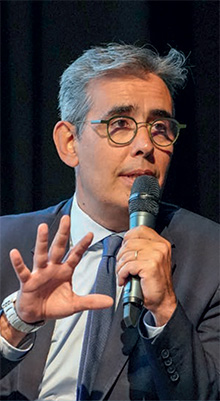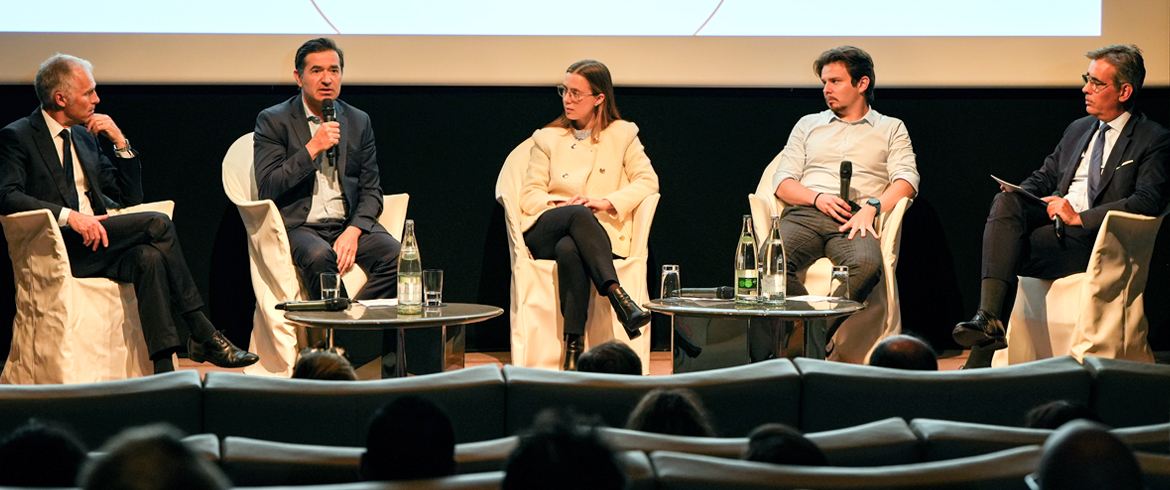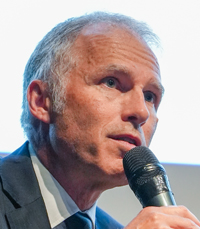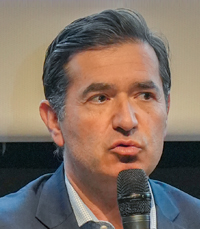OFI INVEST CONFERENCES
invest & act for the future
New energies and the challenge of the energy transition
EDITORIAL
“Renewable energies are as much about decarbonising the economy as investment opportunities”

CEO - OFI INVEST
As asset managers, we have a decisive role to play in the energy transition. Our investment decisions can steer financing towards low-carbon solutions, thus accelerating their development and adoption.
However, the energy transition requires all of us to focus on addressing the challenges awaiting us. The first of these is that the energy transition is not free. Fossil fuels are cheap and abundant, but dirty, and the transition towards decarbonated energies is expensive. The transition will inevitably come with higher energy costs.
While there is a price to be paid in the short term, that is the price of creating a sustainable future for future generations! And, as we know, the cost of doing nothing will be far higher in the long term than the cost of doing something now.
Three other challenges that most stand out:
- Technological innovations. Progress in technologies for producing, storing and distributing low-carbon energies is crucial. As investors, we must support companies that are at the cutting-edge of such innovations.
- Partnerships. The energy transition requires close collaboration between the public and private sectors, between investors and manufacturers, and between nations.
- The regulatory framework and public policies. Governments have a key role to play in setting emission-reductions targets, in subsidising research and innovation, and in creating a pro-sustainable investment environment.
Back from Hong Kong, where I went to visit the staff of our Syncicap AM subsidiary, I was impressed by the speed of the transition in Asia. In 2018, pollution was everywhere, and cars were mostly ICE-based. During my recent visit, 80% of cars were EVs. Progress is astounding, thanks to mobilisation that is everywhere to be seen.
But let’s not overlook social engagement. The energy transition cannot succeed unless everyone is on board. It is crucial to make citizens aware of the advantages of low-carbon energies and to encourage them to be responsible consumers.

Head of Commodities
OFI INVEST ASSET MANAGEMENT
WHY IS SPEEDING UP THE ENERGY TRANSITION NECESSARY?
A few figurers show how urgent it is to accelerate the energy transition. We have less than 30 years to lower our CO2 emissions to zero. And yet, last year, the world set records in oil, gas and coal consumption. Fossil fuels currently account for 83% of primary energy consumed worldwide and account for 70% of CO2 emissions.
Fortunately, there is also some good news. Last year, for the first time, the quantity of installed renewable energy was greater than growth in energy demand. The share of renewable energies in the global energy mix therefore rose. In particular, China accelerated its development of renewable energies. It installed more solar panels in 2023 than the rest of the world combined in the previous year and is five years ahead of its renewable energies development plan, according to the International Energy Agency. China also announced the construction of 150 new nuclear reactors by 2035, with four under construction this year and 10 due to be launched next year.
To bring about this energy transition, all stakeholders will have to be mobilised. This was the main message of our conference on 6 June, which brought together experts in building low-carbon technologies in all fields. These builders of the energy transition provided insight on the challenges to be addressed and the possible solutions for doing so successfully.
ROUND TABLE
NEW ENERGIES AND THE CHALLENGE OF THE ENERGY TRANSITION

SPEAKERS

Co-founder
JIMMY
Jimmy is a French industrial start-up and a pioneer in developing nuclear microreactors to decarbonate industrial heat. Created in 2020, Jimmy has 80 employees and plans to install its thermal generators on its clients’ premises to supply decarbonated and competitive heat. Jimmy has thus far raised 52 million euros.

Chairman
PONTICELLI FRÈRES
With 6000 employees and a footprint in 20 countries, Ponticelli Frères stands out in its commitment to building and maintaining industrial units, with a special focus on renewable and nuclear power. Ponticelli Frères generates annual revenues of 1.2 billion euros.

Chief of Staff and Head of Financing
VERKOR
Verkor, a member of the Next 40 index, specialises in producing low-carbon batteries for EVs. Founded in 2020, Verkor is building a gigafactory in Dunkerque at which it is targeting 50 GWh of production by 2030. Verkor has already raised more than 3 billion euros for its projects and employs more than 500 persons.

Chief Investment Officer
SWEN CAPITAL PARTNERS
An Ofi Invest brand
SWEN Capital Partners, a private equity specialist, has rolled out 900 million euros to support the energy transition, particularly in projects based on technologies – biomethane, hydrogen and other renewable energies – targeted towards helping the heaviest-emitting sectors to decarbonate.
What are the challenges of the energy transition?
Benjamin Louvet: Decarbonating the economy means giving nuclear power an important role. What industrial challenges and obstacles are holding back the development of nuclear power and the implementation of innovative solutions for the energy transition?
Mathilde Grivet: We face many challenges, but, surprisingly, business traction is not one of them. When we offer manufacturers a nuclear reactor supplying decarbonated and low-cost heat, they show lots of interest. The real challenge lies, rather, in industrial execution – ensuring that the supply chain will be ready in time, with certified equipment, and that the construction phase will go off without a hitch. For small modular reactors (SMR), the main challenge is in series production. Once a first one has been produced, the process will have to be scaled up to reduce costs and open the door to massive deployment. The other challenge is regulatory. France’s current nuclear power framework was intended for EdF’s large reactors and is not yet fully adapted to smaller, innovative projects like ours. And, lastly, there are supply chain issues in raw materials, such as uranium, which requires fuel manufacturing and enrichment, involving complex political challenges.
Benjamin Louvet: Regarding the availability of uranium, we are not so worried about short-term supplies. Countries like Australia possess uranium resources that are not yet exploited and that can be quickly brought on line. Are you also running into challenges in terms of financing and human resources?
Mathilde Grivet: Regarding financing, once the first unit is completed – our goal is three to four years between the client’s green light and reactor commissioning – our model should be easily financeable and profitable for investors. However, yes, attracting talent from large groups to a nuclear start-up requires lots of convincing. We have hired 80 people in two years, but that has been costly in both time and money.
Benjamin Louvet: What are some challenges peculiar to the wind and solar sectors?
Olivier Aubert: The main challenge is political and regulatory. A clear and stable energy policy is essential for attracting investors. As for regulation, obtaining a building permit for an industrial facility in France often takes more than five years. These processes must be streamlined for more rapid development of the infrastructures needed for the energy transition.
Benjamin Louvet: And yet, a law has been passed in Europe capping the permit obtention phase at two years, but, unfortunately, the average time for obtaining a wind power permit in most countries is four to five years.
Olivier Aubert: The other issue, is obviously, cost. Producing decarbonated and intermittent power is expensive to get off the ground, as you have to build lots of electrical lines, etc. Producing biomethane, for example, is more expensive than conventional methane, even though it’s good for the planet. For example, a litre of synthetic jet fuel (which reduces emissions by 90%) costs an estimated €10, vs. just €1 for a litre of conventional jet fuel. So, if we want to address this problem seriously, plane ticket prices will have to go up and we’ll probably have to fly less.
Thierry Le Gangneux: This is a key point. Political leaders must tell people the unvarnished truth on the challenges the energy transition is facing. If we promise them a rapid, easy and cheap transition, we’re just deluding them. Examples like Denmark show that quick progress is possible but this requires innovative approaches, favourable regulation, and a societal commitment.
Benjamin Louvet: Another crucial area for a successful energy transition is mobility, in particular the development of electric vehicles. And EVs’ foundation is based on making electric batteries. But there are many challenges in this field, as well.
Enzo Ribeiro: The main issue in our case is financing, as this involves tools that are highly capital-intensive. For example, we need to set up a pilot line without having yet produced anything, nor having won over any clients. This shows that technological and market risk is always with us. And that’s just for the 300 million euros needed for a pilot line, keeping in mind that a gigafactory requires an investment of 2 billion euros.
Benjamin Louvet: Can the market be described as competitive, given how much China dominates it?
Enzo Ribeiro: This is indeed a challenge but one that should be kept in perspective, based on orders of magnitude. The European battery market is projected at about 800 GWh in annual output by 2030. Our first gigafactory will account for 16 GWh, or 2% of the market. So, there’s enough room for everybody, moreover regardless of the technology ultimately chosen. However, the challenge for us consists in scaling up a technology never produced in Europe and that poses many technical difficulties. Building a gigafactory requires acquiring and massively disseminating battery manufacturing skills in a sector that was developed in Asia decades ago and that is just now emerging in Europe. There is a recruiting and training challenge, as these tools are both capital- and labour-intensive. The first gigafactory will mean more than 1000 jobs. Once those people are hired, they will have to be trained.
Benjamin Louvet: You will also have to find metals of acceptable origin at a time when clients demand traceability of metals supply.
Enzo Ribeiro: There is indeed some stress, given the quantity of metals needed to supply the battery industry. At our level, however, we are seeing a certain availability of these metals. The biggest challenge is having a local value chain in Europe, whereas more than 80% of refining capacity is in China.
We can open as many mines as we want in Europe, but if we cannot build concentration and refining facilities, the raw materials will always go through China, and we will lose on the sovereignty front.
Benjamin Louvet: This is the goal of the Critical Raw Materials Act in Europe, which provides that 40% of metals used in Europe must be refined in Europe by 2030. Today refining capacities are expanding in Europe for certain metals like copper, but they are expanding faster in China. China’s share is therefore rising, and there is still a big challenge here. Let’s turn now to solutions that could facilitate the energy transition? What are they?
Thierry Le Gangneux: The basic rule for any energy transition solution is that it must be cost-effective. That’s non-negotiable! Each link in a value chain must be viable. No solution can work if any one link of the chain does not make money. We must find some common sense principles to foster the energy transition without too great of an economic burden for businesses.

Deputy CEO for Business Development
OFI INVEST ASSET MANAGEMENT
What we gather from this discussion – beyond the very real-world challenges to be met so that the energy transition will be in everyone’s interest – is the costs entailed by the energy transition.
Bringing about this transition will inevitably raise energy costs, as well as the costs of metals used in expanding these energies, with a certain impact on companies and investors.
At Ofi Invest, we are developing investment solutions based on price trends of these strategic metals. Integrating a reasonable weighting of these metals in investment allocations provides exposure to the potential appreciation in the asset class, while hedging portfolios that could be impacted by higher costs.

Deputy CEO and CIO
OFI INVEST ASSET MANAGEMENT
In remodeling our economy, the energy transition offers one-of-a-kind investment opportunities. The boom in low-carbon technologies is likely to give rise to new, fast-growing companies, with growth prospects for companies that were able to ride the transition wave and the underlying trends in consumption of metal resources. These are opportunities to generate value for our investors.
But let’s not jump the gun. While the destination looks obvious, the recent past has shown us that the path getting there is less so. That’s why asset management requires keeping permanent watch over technological trends and their impact in terms of needs and resources, but also on the challenges that must be met by economic actors. Ofi Invest AM’s investment teams rely on recognised experts in developing their technical knowledge and deepening their thinking on these issues, in order to grasp the challenges and risks and seize the investment opportunities.
What are the solutions?
Another crucial point is the contractual relationships between clients and suppliers. Risks have been transferred to companies that are far upstream in the value chain, which could put them in jeopardy or turn them away from large projects, due to the lack of resources or support. The success of the energy transition depends on rebuilding a balanced contractual relationship.
Mathilde Grivet: Indeed, the interests of all actors in the value chain must be aligned. Nowadays, the state’s role is not just to provide capital but also to create conditions favourable for making projects financeable, by providing guarantees and streamlining regulations. For investors, there are too many uncertainties on the future taxonomy, financial feasibility or even on the acceptability of carbon credits. Generally speaking, the state must reassure investors by offering them greater visibility and protecting them from administrative and legal uncertainties. For example, building a nuclear project can take 10 years, during which time appeals could cause the authorisations to be cancelled. This can dampen investor enthusiasm. It is essential to create a regulatory and administrative framework that is more suited to current challenges, while ensuring public feedback and environmental protection.
Enzo Ribeiro: The state must indeed provide the impetus. Once we’re off, even if the goal is ambitious, billions can be raised, and we must keep going. We managed to wrap up our financing thanks to the state’s use of low-capital-intensity tools such as public guarantees of bank financing and business contracts. The private sector also has a role to play. For example, lacking public training options in this area, we set up a battery school to train 1600 persons annually, from the CAP trade school diploma to the doctorate level, using more than 70 teaching modules.
Thierry Le Gangneux: The state must also think strategically and intelligently at all levels. In this case, it must also consider these issues from a European angle. Decarbonating electricity in Europe by 2050 is feasible, as long as nuclear power is truly factored into the equation. This means that each country must produce massive amounts of decarbonated electricity, based on its geography and industrial focus. For example, France focuses on hydropower and nuclear; southern Europe on solar; and northern Europe on wind. The state must set a longterm course, regardless of election cycles, so that companies have all the information they need to invest.
Benjamin Louvet: Could biomethane and biohydrogen also be solutions?
Olivier Aubert: A wide variety of technological solutions is needed. For electricity, we have nuclear and renewable energies, but those cover just 25% of energy needs. We also have to decarbonate agriculture, heavy industry, and heavy transport, which cannot be electrified.
Among the solutions, biomethane and renewable hydrogen could supply about 20% of our energy needs.
We could raise production of biomethane if we sorted more of our waste, from which this energy is generated. This is a technology we have mastered for the past 20 years, and one that enjoys a clear regulatory framework on both the French and European levels. Biomethane can be integrated into existing energy networks, replacing fossil fuels that are now being imported.
As for hydrogen, the challenge is its cost and handling, but the technology has been mastered, and the challenge lies in making it accessible and green.
But despite all these efforts to decarbonate the energy sector, we won’t succeed without reducing consumption. And reducing consumption requires energy efficiency and a focused attitude, which, in turn, requires changes in our lifestyles to shrink our energy footprint.
This marketing document contains informational items and quantified data that Ofi Invest Asset Management considers to be well-founded or accurate on the date on which they were produced. Accuracy of items from public sources of information cannot be guaranteed. The analyses herein are based on assumptions and projections of Ofi Invest Asset Management and Ofi Invest group entities that were produced at the time the document was produced, which may fail to be realised in whole or in part on the markets. They are not to be construed as a commitment to positive returns and are subject to modification. This marketing document gives no assurance that the products or services presented and managed by Ofi Invest Asset Management will be suitable to the investor’s financial situation, risk profile or experience and is not to be construed as a recommendation, advice or an offer to buy the financial products mentioned. Ofi Invest Asset Management declines all liability as to any damages or losses resulting from the use of all or part of the items contained herein. Before investing in a mutual fund, all investors are strongly urged to analyse their personal situations, as well as the benefits and risks involved, but without basing themselves exclusively on the information provided in this marketing document, in order to determine the amount that is reasonable to invest. Photos: Shutterstock.com/Ofi Invest. The photo rights presented in this document are reserved by Ofi Invest. Any reproduction thereof is prohibited. FA24/0175/18122025
